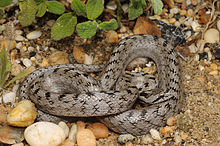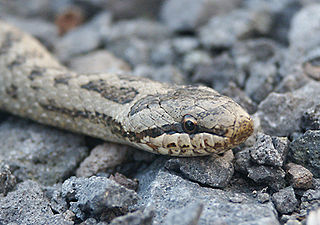
The smooth snake is a species of non-venomous snake in the family Colubridae. The species is found in northern and central Europe, but also as far east as northern Iran. The Reptile Database recognizes two subspecies as being valid, including the nominotypical subspecies described here.
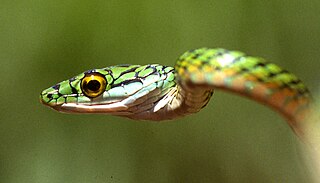
Leptophis ahaetulla, commonly known as the lora or parrot snake, is a species of medium-sized slender snake of the family Colubridae. The species is native to Central America and northern South America.
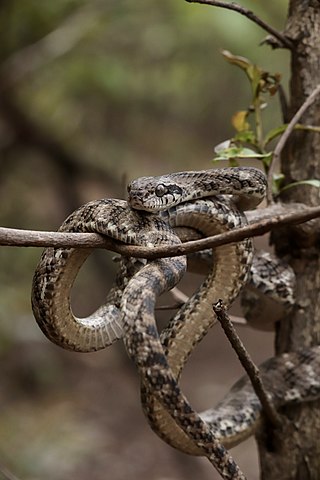
Boiga forsteni, also known commonly as Forsten's cat snake, is a species of mildly venomous rear-fanged snake in the family Colubridae. The species is endemic to South Asia.

The trinket snake, also known commonly as the common trinket snake, is a species of nonvenomous constricting snake in the family Colubridae. The species is native to southern Central Asia.
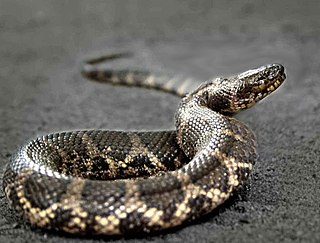
Siebold's water snake, also known commonly as Siebold's mud snake and Siebold's smooth water snake, is a species of mildly venomous, rear-fanged snake in the family Homalopsidae. The species is endemic to Asia.

The many-horned adder is a viper species. It is found in certain rocky desert areas, mostly along the Atlantic coast of southern Africa, in western South Africa and southwestern Namibia. It has characteristic tufts of "horns" above each eye. Like all other vipers, it is venomous. No subspecies are currently recognized.

Philodryas chamissonis, commonly known as the Chilean green racer and the Chilean long-tailed snake, is a species of moderately venomous opisthoglyphous (rear-fanged) snake in the family Colubridae. The species is endemic to Chile.

Coronella is a genus of harmless snakes in the family Colubridae. The genus is endemic to Europe, North Africa and West Asia. Two species are currently recognized as being valid.

The horseshoe whip snake is a species of snake in the family Colubridae. The species is native to southwestern Europe and northern Africa.

Macroprotodon cucullatus, commonly known as the false smooth snake, is a species of mildly venomous colubrid snake endemic to the Mediterranean Basin.

The European ratsnake or leopard snake, is a species of nonvenomous colubrid snake endemic to Europe, Asia Minor, and the Caucasus.
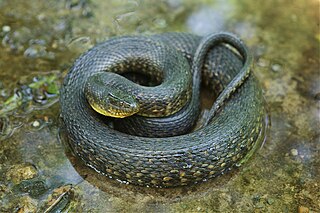
The green water snake is a common species of nonvenomous natricine snake endemic to the southeastern United States.
Polemon barthii, or the Guinea snake-eater, is a species of rear-fanged mildly venomous snake in the family Atractaspididae. The species is endemic to Africa.

The black-headed ground snake, also known as the Palestine kukri snake is a species of small and elegant harmless snake, which is endemic to the Eastern Mediterranean and the Near East. It belongs to the Colubridae family. Two subspecies, Rhynchocalamus melanocephalus melanocephalus and Rhynchocalamus melanocephalus satunini, are currently recognized.

Calamaria gervaisii, commonly known as Gervais's worm snake and the Philippine dwarf snake, is a species of small fossorial snake in the family Colubridae. The species is native to the Philippines.

The olive marsh snake is a species of snake in the subfamily Natricinae of the family Colubridae. The species is endemic to Sub-Saharan Africa.

The ridgehead snake is a species of snake in the family Colubridae. The species is endemic to southeastern Mexico.
Trimerodytes praemaxillaris is a species of snake in the subfamily Natricinae of the family Colubridae. It is also known commonly as Angel's mountain keelback, Angel's stream snake, and the brown stream snake. The species is endemic to Southeast Asia.
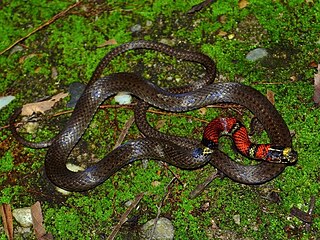
Scaphiodontophis annulatus, commonly known as the Guatemala neckband snake, is a species of snake in the family Colubridae. The species is native to southern Mexico, Central America, and Colombia. There are four recognized subspecies.

Pituophis deppei, commonly known as the Mexican bullsnake and the Mexican pine snake, is a species of nonvenomous colubrid snake endemic to Mexico. There are two recognized subspecies.
